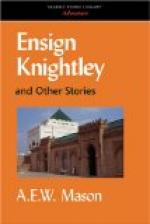He placed his gun and a pouch of cartridges on one side, an unlighted lantern on the other, and then he took up his banjo and again he waited. He waited for a couple of hours, until a light crackle as of twigs snapping came to him out of the forest. Walker struck a chord on his banjo and played a hymn tune. He played “Abide with me,” thinking that some picture of a home, of a Sunday evening in England’s summer time, perhaps of a group of girls singing about a piano might flash into the darkened mind of the man upon the bank and draw him as with cords. The music went tinkling up and down the river, but no one spoke, no one moved upon the bank. So Walker changed the tune and played a melody of the barrel organs and Piccadilly circus. He had not played more than a dozen bars before he heard a sob from the bank and then the sound of some one sliding down the clay. The next instant a figure shone black against the clay. The boat lurched under the weight of a foot upon the gunwale, and a man plumped down in front of Walker.
“Well, what is it?” asked Walker, as he laid down his banjo and felt for a match in his pocket.
It seemed as though the words roused the man to a perception that he had made a mistake. He said as much hurriedly in trade-English, and sprang up as though he would leap from the boat. Walker caught hold of his ankle.
“No, you don’t,” said he, “you must have meant to visit me. This isn’t Heally,” and he jerked the man back into the bottom of the boat.
The man explained that he had paid a visit out of the purest friendliness.
“You’re the witch doctor, I suppose,” said Walker. The other replied that he was and proceeded to state that he was willing to give information about much that made white men curious. He would explain why it was of singular advantage to possess a white man’s eyeball, and how very advisable it was to kill any one you caught making Itung. The danger of passing near a cotton-tree which had red earth at the roots provided a subject which no prudent man should disregard; and Tando, with his driver ants, was worth conciliating. The witch doctor was prepared to explain to Walker how to conciliate Tando. Walker replied that it was very kind of the witch doctor but Tando didn’t really worry him. He was, in fact, very much more worried by an inability to understand how a native so high up the Ogowe River had learned how to speak trade-English.
The witch doctor waved the question aside and remarked that Walker must have enemies. “Pussim bad too much,” he called them. “Pussim woh-woh. Berrah well! Ah send grand Krau-Krau and dem pussim die one time.” Walker could not recollect for the moment any “pussim” whom he wished to die one time, whether from grand Krau-Krau or any other disease. “Wait a bit,” he continued, “there is one man—Dick Hatteras!” and he struck the match suddenly. The witch doctor started forward as though to put it out. Walker, however, had the door of the




